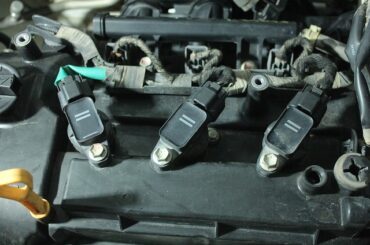Contents
Introduction
Brake pads are an integral component of this system, responsible for creating the necessary friction to slow down or stop the vehicle. However, in some unfortunate cases, brake pads can fall off, leading to compromised braking performance and potential dangers on the road. In this article, we will explore the causes, signs, and consequences of a falling brake pad, as well as immediate actions to take and preventive measures to avoid such incidents.
Brake Pad Fell Off

Causes of Brake Pad Failure
Brake pad failure can occur due to various reasons. One common cause is wear and tear resulting from regular usage. Over time, the friction material on the brake pads gradually erodes, eventually leading to a thinner pad or complete pad detachment. Improper installation or maintenance can also contribute to brake pad failure. If the brake pads are not securely fastened or if the caliper bolts are loose, there is an increased risk of the pads coming off. Additionally, using poor-quality brake pads that do not meet industry standards can make them more prone to failure.
Signs and Symptoms of a Falling Brake Pad
Detecting a falling brake pad early on is essential to prevent potential accidents. Unusual noises during braking, such as squealing or grinding sounds, can indicate brake pad issues. Reduced braking performance, where the vehicle takes longer to stop or requires increased pressure on the brake pedal, is another sign. Uneven wear on the brake pads or visible gaps in the brake pad assembly are also indicators of a falling brake pad.
Dangers and Consequences of a Fallen Brake Pad

A fallen brake pad poses serious risks and consequences for drivers and other road users. One of the primary dangers is an increased stopping distance. With a brake pad missing or severely worn, it takes longer for the vehicle to come to a complete stop, reducing the driver’s control over the vehicle. Moreover, a fallen brake pad can cause damage to other braking system components, such as the rotor or caliper. These damages can be costly to repair and further compromise the overall braking performance. Most importantly, driving with a fallen brake pad significantly raises the likelihood of accidents and injuries.
Immediate Actions to Take
If you suspect that a brake pad has fallen off, it is crucial to react promptly and appropriately. Apply the emergency or parking brake to slow down the vehicle and reduce the risk of accidents. Safely pull over to the side of the road, away from traffic, and inspect the brake pad assembly. Ensure that there are no loose or missing brake pads. If you need more clarification on the issue or need more expertise, it is essential to seek professional assistance from a qualified mechanic or automotive service center.
Preventive Measures
Preventing brake pad failure is key to ensuring vehicle safety. Regular inspection and maintenance of the braking system are essential. Check the brake pads periodically for signs of wear, and have them replaced if necessary. Ensure the brake pads are securely fastened during installation according to the manufacturer’s guidelines. Opt for high-quality brake pads that meet industry standards to minimize the risk of failure. Following the vehicle manufacturer’s maintenance schedule and guidelines can also help prevent brake pad issues.
Common Myths About Brake Pads Falling Off
There are several misconceptions surrounding brake pads falling off. One common myth is that brake pads never fall off on their own. While it is true that brake pads are designed to remain secure during regular operation, various factors can contribute to their failure. Another myth is that only old vehicles experience brake pad failures. Brake pads can fail prematurely for various reasons, regardless of the vehicle’s age. Finally, a fallen brake pad may not be a serious issue. However, as highlighted earlier, driving with a fallen brake pad can have severe consequences and compromise the safety of the driver and others on the road.
Frequently Asked Questions (FAQs)
1. Can I drive with a fallen brake pad? Driving with a fallen brake pad is highly discouraged as it poses significant risks. It can compromise your ability to stop the vehicle safely and increases the chances of accidents. It is essential to address the issue immediately and seek professional assistance.
2. How often should I inspect my brake pads? Regular inspection of brake pads is recommended as part of routine vehicle maintenance. It is advisable to check them every six months or as the vehicle manufacturer or your mechanic recommends. However, if you notice any signs of brake pad issues, such as unusual noises or reduced braking performance, inspect them promptly.
3. Can I replace the brake pads myself? While some experienced individuals may be capable of replacing brake pads themselves, it is generally recommended to seek professional help. Proper installation and alignment of brake pads are crucial for optimal braking performance and safety. A qualified mechanic can ensure that the replacement is done correctly.
4. What are the signs of worn-out brake pads? Signs of worn-out brake pads include squealing or grinding noises during braking, reduced braking performance, longer stopping distances, uneven wear on the brake pads, and visible gaps or missing parts in the brake pad assembly.
5. Are there any legal consequences for driving with a fallen brake pad? Driving with a fallen brake pad can lead to legal consequences, as it compromises the vehicle’s safety and puts others at risk. In many jurisdictions, driving with a faulty braking system is against the law and can result in fines or other penalties. It is essential to address brake pad issues promptly to comply with legal requirements and ensure road safety.
Conclusion

A fallen brake pad is a serious issue that can compromise the safety of the driver and other road users. Understanding brake pad failure’s causes, signs, and consequences is essential for prompt detection and appropriate action. If you suspect a fallen brake pad, stay calm, apply the emergency brake, and pull over safely to inspect the brake pad assembly. Seeking professional assistance and following preventive measures, such as regular inspection and maintenance, can help prevent brake pad issues in the first place. Remember, the safety of your vehicle and everyone on the road depends on well-maintained brake pads and a properly functioning braking system.
Unleashing the Unforgettable: Dynamic Static Car Spectacle of 2023 – An Automotive Extravaganza






